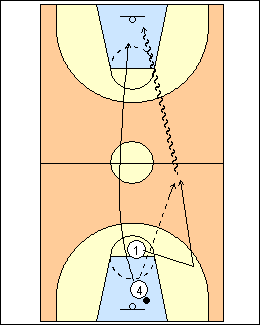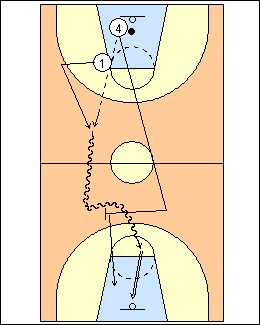1 (secondary)
 | 1 Secondary fast break (based on coachesclipboard.ca) 4 self rebounds and outlets to 1, who attacks the far basket. 4 will jump, catch with two hands, make a quarter turn in the air and land looking upcourt with the ball held at the ear with both hands. Once 4 has the ball, 1 goes vertical to pressure the defence and create space, cuts straight back to the ball if 4 is in trouble (in the drill, holding the ball low). 1 can make a Steve Nash circle cut (cut in front of a defender as he cuts back). Options - 1 shoots to start, 4 rebounds and outlets a miss, inbounds a make - 4 can use a vertical break-out dribble on a miss, 1 exit cuts upcourt - add a defender who can guard the rebounder or outlet (if jammed, the rebounder pivots opposite and uses a vertical break-out dribble) - add a second defender for 2 on 2. Jay Triano - when a shot goes up the point guard gets his butt to the sideline. He can come back to the ball if pressured, otherwise can start going up the floor for a lead pass. Peter Lonergan - Defining the Outlet - be on the move towards the sideline, catch an outlet pass near the elbow, front pivot, potentially make a pass. If there is no catch at the elbow, get butt to the sideline, foul-line extended. Brent Tipton - 2 Side Transition - 1 loops to receive an outlet, stampedes the catch by already moving downhill with chest to halfcourt (running through the elbow). Jr. NBA - Receiving the Outlet Pass - get your back to the sideline, be visible and verbal (call for the ball), catch on the move (upcourt). Mike Brown - people teach their guards to come out to the wing and make themselves available, they don't do that, they want deep outlets, as soon as a guard reads that a teammate is about to get a rebound, turn and run up the floor for a pass on the run, often an overhead or maybe baseball pass. |
 | 2 Coming back, 4 rebounds and makes an inbounds pass (make) or outlet pass (miss). After a make, 1 also creates space with a misdirect cut then shows his target hands on a circle cut back to the ball (for a control pass), or a back cut away from the ball (an attack pass). If a defender shows chest in a game, 1 takes a couple of hard steps into him then back cuts; if the defender shows fingertips/forearm, 1 takes a couple of hard steps into him then face cuts to get in front - swim over a low arm, rip underneath a high arm. If the defender takes away the step-over, spin back the opposite direction. 1 makes the same reads on a miss, but must also read a break-out dribble by the rebounder. 1 or 4 can shoot coming back, e.g. - 1 shoots a pull-up jumper - 1 hits 4 for a trail shot - drag pick and roll (shown). Repeat up and back, or repeat unless (or until) both shots are makes. Dave Arseneault - Fast Break - after a make, 1 tries to loop across the lane from weakside to ballside and receive an inbounds pass with a head of steam. |
This page was made with Basketball playbook from Jes-Soft
